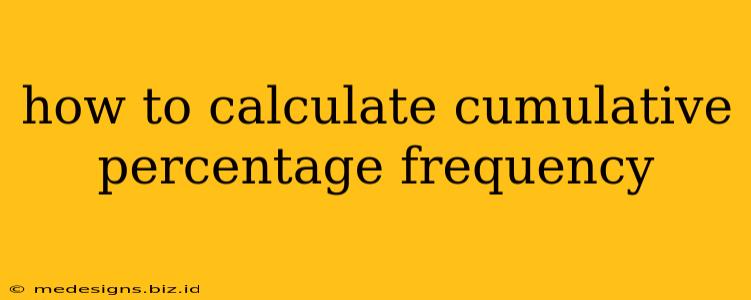Calculating cumulative percentage frequency is a crucial step in data analysis, providing insights into the proportion of data points falling below a certain value. Understanding this calculation is essential for interpreting statistical data effectively, and this guide will break down the process step-by-step.
Understanding Cumulative Frequency and Percentage Frequency
Before diving into the calculation, let's clarify the underlying concepts:
-
Frequency: This simply represents the number of times a particular value or data point occurs in a dataset.
-
Cumulative Frequency: This is the running total of frequencies. It shows the total number of observations up to a specific point in the data range.
-
Percentage Frequency: This expresses the frequency of each value as a percentage of the total number of observations.
-
Cumulative Percentage Frequency: This is the running total of percentage frequencies, showing the percentage of observations that fall below a given value. It essentially expresses the cumulative frequency as a percentage of the total.
Step-by-Step Calculation of Cumulative Percentage Frequency
Let's illustrate the calculation with an example. Suppose we have the following data representing the scores of 20 students on a test:
| Score | Frequency |
|---|---|
| 60 | 2 |
| 70 | 5 |
| 80 | 6 |
| 90 | 4 |
| 100 | 3 |
Here's how to calculate the cumulative percentage frequency:
Step 1: Calculate the Cumulative Frequency
Add the frequencies cumulatively:
| Score | Frequency | Cumulative Frequency |
|---|---|---|
| 60 | 2 | 2 |
| 70 | 5 | 7 (2+5) |
| 80 | 6 | 13 (7+6) |
| 90 | 4 | 17 (13+4) |
| 100 | 3 | 20 (17+3) |
Step 2: Calculate the Percentage Frequency
Divide each frequency by the total number of observations (20 in this case) and multiply by 100:
| Score | Frequency | Percentage Frequency |
|---|---|---|
| 60 | 2 | (2/20) * 100 = 10% |
| 70 | 5 | (5/20) * 100 = 25% |
| 80 | 6 | (6/20) * 100 = 30% |
| 90 | 4 | (4/20) * 100 = 20% |
| 100 | 3 | (3/20) * 100 = 15% |
Step 3: Calculate the Cumulative Percentage Frequency
Add the percentage frequencies cumulatively:
| Score | Frequency | Percentage Frequency | Cumulative Percentage Frequency |
|---|---|---|---|
| 60 | 2 | 10% | 10% |
| 70 | 5 | 25% | 35% (10% + 25%) |
| 80 | 6 | 30% | 65% (35% + 30%) |
| 90 | 4 | 20% | 85% (65% + 20%) |
| 100 | 3 | 15% | 100% (85% + 15%) |
The final column shows the cumulative percentage frequency. This tells us, for example, that 65% of students scored 80 or less on the test.
Applications of Cumulative Percentage Frequency
Cumulative percentage frequency is a valuable tool in various applications, including:
- Descriptive Statistics: Understanding the distribution of data and identifying percentiles.
- Data Visualization: Creating cumulative frequency curves or ogives to visually represent data distribution.
- Probability and Statistics: Estimating probabilities and making inferences about populations.
- Business and Economics: Analyzing sales data, customer demographics, and market trends.
By following these steps, you can effectively calculate cumulative percentage frequency and gain valuable insights from your data. Remember that accurate data entry is crucial for obtaining reliable results. Using spreadsheet software like Excel or Google Sheets can significantly simplify the calculations.
